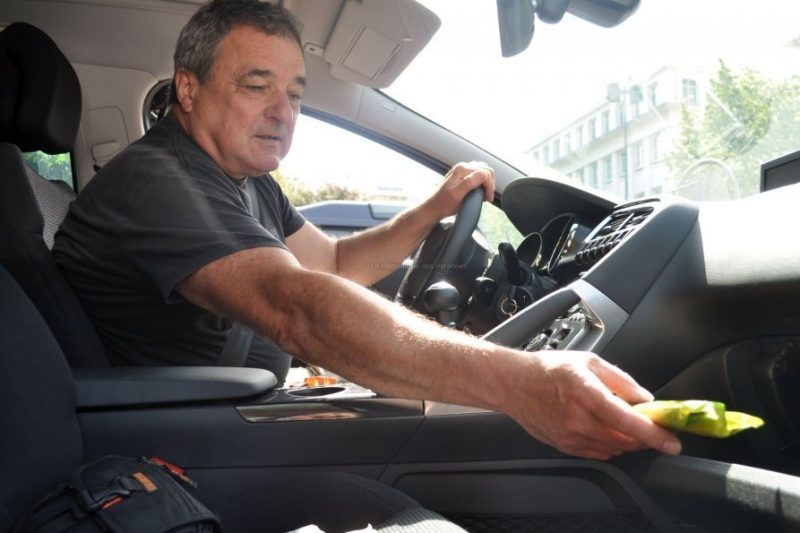You may not be aware of it, but as and from the 1st of July, it has become illegal in France to drive a car in the country without having on board an Éthylotest. A wha’, Gay? An Éthylotest (pronounced ‘ay-tee-low-test’) – that’s what it’s called.
It’s the little device that you blow into in order to ascertain whether or not you’ve had too much to drink to be legally able and sober enough to drive a vehicle.
The day was bound to come when it was going to be made law that you test yourself. After all, it is yet another of those tiresome things that officers of the law have to waste their time doing. The bill governing this particular area was passed, in fact, in 1970. It was only given a decree bringing it to life very recently.
If you don’t have an Éthylotest in your car, then you’re in trouble. As you might well imagine, the measure has been met with some controversy in France. Many see it as a cynical exercise in wallpapering over a serious issue – bringing in a measure that is seen to do something about drink-driving without actually tackling its root causes. Others see it as a positive thing; putting responsibility for alcohol intake firmly back on the citizen’s shoulders.
One dissenting voice in France is the President of the League Against Road Violence; Ms Chantal Perrichon. She says that the measure is “useless”, pointing out that in 80% of fatal road accidents involving alcohol, the blood-alcohol levels in the perpetrator are above 1.2g – a level at which the abusers in question won’t be in any sort of condition to carry out self-testing measures on themselves.“The only ones that this law will benefit are the manufacturers!” So said Ms Perrichon, saying that the whole business represents a “major conflict of interest” and is disappointed that such a “serious issue” is not being dealt with “a little more seriously.”
She may well have a point. Such was the speed at which the measure was brought into law, that there are only two companies licensed to sell Éthylotests. One of them – I-Tests – has the monopoly (at the time of writing) on supplying the gendarmes and various police forces in the country.
For Irish tourists, meanwhile, here are the main facts on Éthylotests that you need to know but might have been a bit too confused or afraid to ask about:
1. Sanctions: There has been a lot of talk about this one, with some media outlets in Ireland reporting potential fines of up to €50. The fact is that although the measure came into law on the first of July, sanctions won’t be in place until the 1st of November this year. From this point on, you can incur a fine of €11 if you don’t have an Éthylotest in your vehicle that isn’t past its sell-by date.
2. Vehicles: The law covers all motorised vehicles, except what the French call cyclomoteurs. These are non-existent in Ireland and are essentially bicycles with a little engine attached to the front while to help it along. Otherwise, the only vehicles exempt from the law are coaches equipped with their own anti-alcohol ignition preventer system (no, I never heard of it before either).
NB – car hire companies are not obliged to provide an Éthylotest but the person hiring the car is.
3. Types: There are two types of Éthylotest – the chemical test and the electronic one. The chemical test is a disposable item destined to be used once only and it will cost between just €1 and €2. It goes green if you’re over the limit without giving you a precise reading as to how drunk you are. It has a shelf life of two years.
The electronic test is a reusable device that costs €99 (excluding the cost of replaceable tips). Another potential cost is that of batteries if it doesn’t come equipped with a cigarette-lighter plug. You’re meant to re-test it every year or every 300 uses; something that might cost you another €30.

"Quelque chose pour le week-end, Monsieur?" The pharmacy is one place to stop and get your 'protection'
NB – Make sure that any device you buy has the NF mark on it, indicating that it conforms to French government standards. Over the period of a month and a half, French authorities have intercepted 25,000 counterfeit Éthylotests, all believed to be destined for the online sales market.





 Tootlafrance is Ireland’s fresh new eyes on France, bringing you the latest news, exclusive celebrity interviews, political analysis, cultural events, property news and, of course, travel features written by top Irish journalists.
Tootlafrance is Ireland’s fresh new eyes on France, bringing you the latest news, exclusive celebrity interviews, political analysis, cultural events, property news and, of course, travel features written by top Irish journalists.
I was stopped on an N road going for the ferry near Nantes last Friday. Communication was poor (I no French and he no Engligh) but I knew he was looking for the breathalyser. In the end, I just shrugged and he just laughed and let me off.
I came across a road block looking for them too. They were stopping French cars but just waved foreign cars through. We had actually bought the breathalyser in Leclerc.
The same thing happened to us in Brittany. I don’t think they’re too bothered about the breathylser for Irish people. They just checked my driving licence. The whole thing is a bit daft, all right. I hear that they sell them in dispensers outside of pubs and discos